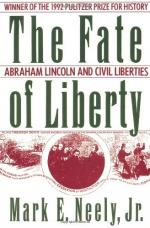
|
| Name: _________________________ | Period: ___________________ |
This test consists of 15 multiple choice questions and 5 short answer questions.
Multiple Choice Questions
1. How are Confederate deserters often treated by Union troops in Chapter 4?
(a) They are executed.
(b) They are sent to POW camps.
(c) They are interrogated, and then sent to Canada.
(d) They swear an oath of loyalty and are released.
2. Why are judges still issuing writs of habeas corpus in Chapter 3?
(a) They are sympathetic to the Confederacy.
(b) They are waiting on a statement from the Supreme Court.
(c) Broken rail lines have delayed official information.
(d) Lincoln has yet to publicize his suspension of habeas corpus.
3. In 1864, what bogus presidential proclamation is published in the New York "World" and the "Journal of Commerce"?
(a) The announcement of a new 400,000-man draft.
(b) An announcement of a truce.
(c) A report of new taxes being levied by Lincoln.
(d) A report of a White House fire.
4. What book does Dennis A. Mahony write after his release?
(a) The Prisoner of State.
(b) The American Bastile.
(c) The Merryman.
(d) Low Tide for Liberty.
5. Who is Edwin M. Stanton?
(a) A Brigadier General of the Union Army.
(b) The Attorney General.
(c) Lincoln's Secretary of State.
(d) Lincoln's Secretary of War.
6. After what battle do arrests of Southern citizens begin to decline?
(a) Gettysburg.
(b) Vicksburg.
(c) Chickamauga.
(d) Antietam.
7. What does General Order No. 104 request that civilian and military authorities do?
(a) Report all strangers and suspected derelicts to the Union Army.
(b) Interfere as little as possible with commerce while capturing draft dodgers.
(c) Place all thieves and blockade runners under arrest.
(d) Turn in all information about spies and suspicious personnel.
8. Why does the War Department arrest John N. Eitel in 1865?
(a) For running good through blockades.
(b) For exercising freedom of expression.
(c) For bringing illegal goods across picket lines.
(d) For brokering Army enlistments.
9. Which newspaper does Chauncey Burr publish in Chapter 3?
(a) The "American Bastile."
(b) The "Merryman."
(c) The Dubuque "Herald."
(d) The Newark "Evening Journal."
10. Which group of Americans is excluded from Grant's order in Chapter 4?
(a) Children.
(b) Quakers.
(c) Pilgrims.
(d) Women.
11. Who is Samuel E. Perkins?
(a) An Illinois journalist.
(b) The district attorney of Indiana..
(c) A Illinois lawyer.
(d) A Democratic journalist and Indiana Justice.
12. What war time legal practice is revived due to the rise of guerilla warfare in America?
(a) Military commissions.
(b) Seizure of property.
(c) Execution squads.
(d) Hangings.
13. Who sets John Eitel's bail in Chapter 5?
(a) Ulysses S. Grant.
(b) Charles A. Dana.
(c) President Lincoln.
(d) Edwin M. Stanton.
14. Why is Nathaniel Bachelder arrested in Chapter 3?
(a) For raising forces for the Confederacy.
(b) For bringing illegal goods across picket lines.
(c) For selling alcohol to Union troops.
(d) For warning recruits they will go to hell.
15. Which judge challenges President Lincoln's right to suspend the writ of habeas corpus?
(a) Attorney General Edward Bates.
(b) Chief Justice Roger B. Taney.
(c) Provost Marshal General Bernard G. Farrar .
(d) Assistant Judge William M. Merrick.
Short Answer Questions
1. Dennis A. Mahony is editor of which newspaper in Chapter 3?
2. In Chapter 2, on what charge are civilians who burn bridges typically tried?
3. How does Lincoln justify the suppression of such constitutional rights such as freedom of speech, freedom of the press, and habeas corpus?
4. What nickname is given to President Lincoln?
5. Why does Joseph Griffin sue Captain Frank Wilcox for false imprisonment?
|
This section contains 601 words (approx. 3 pages at 300 words per page) |

|




